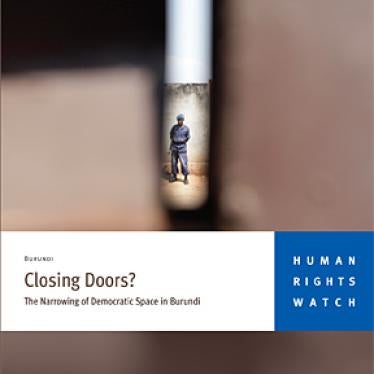(Nairobi) - Burundi's decision to restore legal status to a prominent activist group banned in 2009 is a positive step and should prompt further government actions to engage with civil society, Human Rights Watch said today.
On January 28, 2011, Interior Minister Edouard Nduwimana reversed a November 2009 order that had banned the Forum for the Strengthening of Civil Society (Forum pour le Renforcement de la Société Civile, FORSC). FORSC is an umbrella organization that coordinates initiatives by Burundian civil society groups and has often criticized human rights violations by the government. Human Rights Watch and other Burundian and international organizations had denounced the 2009 ban as a violation of the right to freedom of association.
"Burundi has taken a positive step for freedom of association by ending the ban on FORSC," said Daniel Bekele, Africa director at Human Rights Watch. "We hope this means that the government will stop regarding civil society as an enemy and instead recognize the contributions of groups like FORSC and engage with them."
FORSC is one of Burundi's most outspoken organizations. It has worked on a range of issues including good governance, transitional justice, and the need to protect human rights defenders. The government ban was announced soon after FORSC president Pacifique Nininahazwe publicly condemned alleged government involvement in the killings of Ernest Manirumva, an anti-corruption activist, and Salvator Nsabiraho, a young man beaten to death by police. Interior Minister Nduwimana claimed at the time that the ban was linked to technical problems with the organization's membership.
The ban was lifted after the government responded positively to FORSC's efforts to reengage in dialogue, following several months of tense relations between government and civil society organizations. Five journalists and media workers were arrested in 2010; two of them, Jean Claude Kavumbagu and Faustin Ndikumana, remain jailed on apparently politically motivated charges. FORSC's Nininahazwe and other activists reported being subjected to surveillance in late 2010. Relations between activists and the government have been particularly tense since the unsolved killing of Manirumva in April 2009. Several organizations have publicly accused police officials of involvement in the killing and have criticized the judicial system's failure to pursue high-ranking suspects. In response, government officials have warned activists against speaking out on sensitive security and justice issues.
Following an election period in 2010 marked by political violence, an opposition boycott of the elections, and the torture of several opposition leaders, some civil society activists were accused by government officials of being "political opponents" or "enemies." Human Rights Watch's representative in Burundi was expelled in June, after the government alleged that she was politically biased. In an August memorandum, FORSC and other groups called on the government to treat the media, civil society, and the political opposition as partners and to choose dialogue instead of repression.
"The interior minister's reversal of the ban on FORSC leads us to hope the Burundian government has recognized that repression of civil society is neither a reasonable nor a constructive response to criticism," Bekele said. "We hope that this augurs a new era of positive engagement. We urge the government to put an end to intimidation and restrictions against other activists and journalists."







